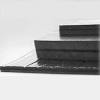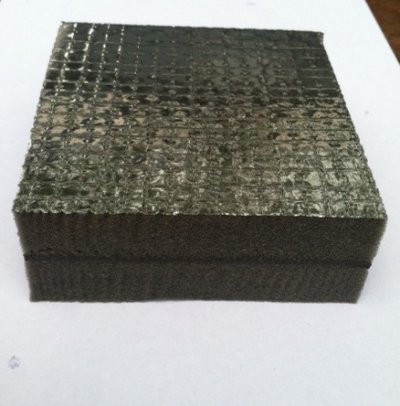The science of noise reduction leads all manufacturers down the same type design path. A typical vinyl / foam composite insulation will look very similar regardless of who made it and is the most appropriate insulation for most of the vessels talked about here.
The face will be a vapor barrier to protect the foam from absorbing engine room vapors and give it some physical protection. This will be very thin to allow noise to penetrate to the:
Absorption layer, which will reduce the noise in the engine space by not increasing it do to reverberation. The next layer is the
Barrier Layer. This used to be lead, and was used in 1 or 2 lb per sq ft sizes. Lead got too pricey and is toxic so the entire industry switched to mass loaded vinyl, in 1 or 2 lb per sq ft sizes. Works as well as lead, weighs the same as lead, is cheaper and in some ways better. The last layer is:
The decoupler layer. This layer decouples the mass layer from the bulkhead or overhead enhancing the performance of the mass layer as a barrier.
US manufacturers of these products are the previously mentioned Soundown as well as Technicon and American Acoustical. They all make the same style insulation because they all have to abide by the same laws of noise reduction.
There are differences in the grade or quality of the components as well as the laminating process between these manufacturers. Of these 3 manufacturers, Soundown is primarily marine and dabbles in other industries, and the other two are primarily automotive and industrial and dabble in marine.
Wherever you purchase an insulation like described above and looks kind of what's pictured below most probably came from one of these 3 manufacturers.
As for fire resistance, all the components in this type insulation will typically be self extinguishing, but will burn if exposed to an open flame. For incombustible insulation you have to go to fiberglass, ceramic, mineral wool, or exotic materials.
When it comes to noise the rule is simple, more is better. The more stuff you put between you and the noise the more noise will be reduced. Engineered noise products like vinyl / foam composites give the best performance for a given installation space for a reasonable price. The mass loaded vinyl by itself will reduce noise, but not as well as if part of a composite.
Foam or anything soft will reduce noise in the engine space, ant therefore reduce noise throughout the vessel, but because it has little mass will not be a very good barrier.




